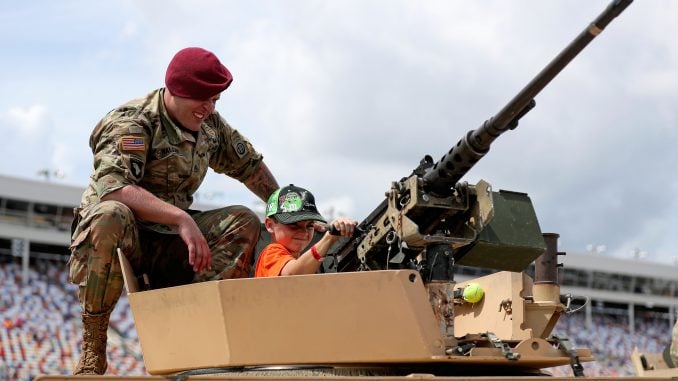
RALEIGH – Bloomberg News reported on Monday that U.S. Army leaders have included the Research Triangle among its top choices for a new command center that will lead an organizational effort to look at future threats the Army faces and what technology is needed to counter those threats.
Raleigh and Boston appeared to have made the cut along with three other communities not yet made public. Atlanta, Austin, Chicago, Dallas, Denver, Houston, Los Angeles, Minneapolis, New York City, Philadelphia, San Diego, San Francisco and Seattle were previously in the running.
Projects slated for likely development at this new center include components of several major new weapons systems. According to Army officials, a top priority will be the support of the infantryman, and improving “soldier lethality.” This could include improving long-range precision strike capabilities, self-propelled howitzers, battlefield rocket systems, and designing a “vertical lift” helicopter or aircraft.
N.C. Senator Thom Tillis released a statement on Monday touting the area’s many attractions for this type of facility, noting the valuable combination of location, technology centers, businesses and academic resources.
“This decision comes as no surprise. Raleigh would be a perfect host of the Futures Command and the perfect home for the soldiers and their families, DoD civilians, academics, scientists, engineers, and innovators who are involved with the effort,” he said. “Raleigh is in close proximity to Fort Bragg and the area offers an incredible combination of high quality of life, affordable cost of living, and world-class research institutes that would support the Army. I will continue to work with our state leaders on a bipartisan basis over the next month to show that Raleigh truly is Army Strong.”
This announcement comes after many months of work involving Army leaders, state and local officials, the UNC system and a robust group of North Carolina-based military and economic development stakeholders.
The North Carolina Military Business Center (NCMBC) is part of the most comprehensive statewide infrastructure in the country to help businesses start, grow and leverage new markets, including federal contracting. This infrastructure includes public sector organizations like the community college and university systems, the Small Business and Technology Development Center and the NCMBC – as well as non-governmental organizations like the N.C. Military Foundation (NCMF). All of these entities have unique and complimentary missions and operational focuses, but contribute collaboratively to growing the military economy in the state.
The NCMBC, the North Carolina Defense Technology Transition (NCDEFTECH) Office and several organizations served on the team – led by the NCMF – that worked since October of 2017 to develop the State’s initiative to locate the Army Futures Command in North Carolina.
“The Army Futures Command locating in the Research Triangle Park would be a tremendous catalyst to grow the military economy exponentially in North Carolina,” said NCMB Executive Director Scott Dorney.
Dorney noted the partnerships that orchestrated this process across the state, from government and private sector entities alike, and was optimistic about the significant potential for growth the command center could produce throughout the state’s civilian and military communities.
“Although the military is already the second largest sector of the state economy, locating this Army four-star command in the Triangle would likely bring numerous defense contractors to the region, and stimulate tremendous opportunity for existing businesses in North Carolina to develop and transition new technologies into the Army, into the Department of Defense and into the hands of America’s warfighters.”
The Army expects the new headquarters to house about 500 civilian workers and uniformed staff who will work under a four-star general. A final decision will be made by June 30.
